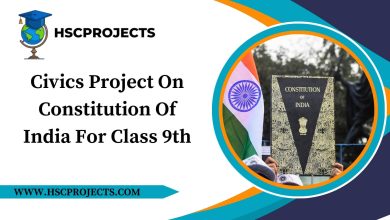
English Project On William Words Worth For Class 10
Acknowledgment
In the culmination of this literary exploration into the life and works of William Wordsworth, I extend heartfelt acknowledgments to those whose contributions have enriched the journey and added depth to our understanding.
First and foremost, gratitude goes to William Wordsworth himself, whose timeless verses have been our guiding stars in navigating the intricacies of nature, emotion, and imagination. His literary legacy has served as a beacon, illuminating the vast landscapes of Romantic poetry.
I extend sincere thanks to the scholars and biographers whose meticulous work provided the foundation for our examination of Wordsworth’s life. Their insights and research have been instrumental in shaping the narrative and uncovering the layers of influence that molded the poet’s vision.
To the literary critics whose perspectives we’ve explored, thank you for lending your discerning gaze to Wordsworth’s poetry. Your critiques have added nuance to our understanding, highlighting the complexities and diverse interpretations that make his work a subject of ongoing fascination.
A nod of appreciation goes to the educators and institutions that have preserved and disseminated knowledge about Wordsworth. Your commitment to literature and the arts ensures that the poet’s contributions continue to inspire generations of readers and scholars.
I express gratitude to the libraries, archives, and online repositories that house the wealth of resources essential to our research. Your dedication to preserving literary history is the cornerstone upon which projects like this one can thrive.
Special thanks are due to the creators of digital platforms and databases that have democratized access to scholarly works. Your efforts in making information accessible have been invaluable in broadening the reach of this exploration.
I extend my appreciation to fellow enthusiasts of literature and poetry, whose passion and shared insights have added vibrancy to our discourse. The collaborative spirit within the community has enriched the exploration of Wordsworth’s world.
Finally, I acknowledge the unwavering support and encouragement of friends and family during the course of this project. Your belief in the importance of literary exploration has been a source of inspiration and motivation.
As we conclude this odyssey through the poetic landscapes of William Wordsworth, it is with gratitude and a deep appreciation for the collective effort that has brought this project to fruition. May the echoes of Wordsworth’s verses continue to resonate, inspiring future explorations into the boundless realms of literature.
Introduction
Welcome to a literary odyssey that traverses the life and verses of the eminent English poet, William Wordsworth. In the pages that follow, we embark on a captivating journey through the verdant landscapes of Wordsworth’s poetry, exploring the profound impact of his words on literature and the enduring legacy he has etched in the annals of literary history.
Our quest begins with an intimate look at the life and times of Wordsworth, where we unravel the threads of his birth, early years, and the educational tapestry that molded him into a poetic luminary. A spotlight on the influences shaping his vision, particularly his transformative encounters with nature, sets the stage for a deeper understanding of the man behind the verses.
As we venture into the heart of Wordsworth’s poetic realm, we immerse ourselves in the sublime connection he shares with nature. Specific poems, such as “Lines Composed a Few Miles Above Tintern Abbey” and the ethereal “I Wandered Lonely as a Cloud,” become our guides through the poetic landscapes where nature serves as both muse and spiritual refuge.
Our exploration extends beyond the individual brilliance of Wordsworth, positioning him within the broader canvas of the Romantic literary movement. Comparisons with fellow poets of the era illuminate shared themes and distinctive features, offering a panoramic view of the revolutionary period that shaped the course of literature.
Delving into the tapestry of Wordsworth’s themes and poetic style, we analyze selected gems like “The Daffodils” and “Lines Written in Early Spring.” Solitude, childhood, and the sublime emerge as recurring motifs, while vivid imagery and symbols paint landscapes that transcend the limitations of mere words.
The project unfurls further to explore Wordsworth’s enduring impact on literature, from his time to subsequent generations of poets. Literary criticism becomes our compass, navigating through different perspectives on his works and addressing the challenges faced by Wordsworth as he carved his niche in the literary sphere.
No exploration of Wordsworth is complete without a foray into his philosophy of poetry, as articulated in the Preface to “Lyrical Ballads.” We delve into the intricate relationship between the poet, society, and the creative process, understanding the profound influence of Wordsworth’s philosophy on the Romantic movement.
As we draw the curtains on this odyssey, the conclusion invites reflection on the key aspects of Wordsworth’s life and poetry. It reinforces the enduring impact of his work, encouraging a deeper appreciation for the intertwining realms of nature and imagination. The importance of studying Wordsworth’s contributions to literature becomes the final refrain, echoing through the corridors of our literary exploration.
Join us as we navigate the enchanting realms of William Wordsworth’s poetic universe, where each stanza is a brushstroke on the canvas of literary brilliance.
Biography of William Wordsworth
Dive into the pages of William Wordsworth’s life, tracing the contours of his birth, early days, and the intellectual tapestry that shaped his poetic soul. Peer into the influences that molded his vision, with a spotlight on his profound encounters with nature. Walk alongside the poet through key life events that left an indelible mark on his unique perspective, a perspective that would echo through the corridors of literary history.

Nature as a Source of Inspiration
Feel the pulse of Wordsworth’s heartbeat with nature as its rhythmic companion. Explore the verdant realms of “Lines Composed a Few Miles Above Tintern Abbey” and dance with the daffodils in “I Wandered Lonely as a Cloud.” Unearth the layers of inspiration, solace, and spiritual rejuvenation that nature gifted Wordsworth, becoming both muse and confidante.
The Romantic Movement
Situate Wordsworth amidst the tumultuous waves of the Romantic literary movement. Chart comparisons with fellow Romantic poets, illuminating shared themes and distinctive features that define this revolutionary period. Engage in a discourse on the key characteristics of Romantic literature that find their echo in Wordsworth’s verses, perpetuating the movement’s essence.
Key Poems and Themes
Embark on a poetic odyssey as we dissect selected gems like “The Daffodils” and “Lines Written in Early Spring.” Peer into the thematic tapestry woven by Wordsworth, exploring the threads of solitude, the innocence of childhood, and the majestic allure of the sublime. Uncover motifs and symbols that enrich his poetry with vivid imagery, transforming words into living landscapes.
Poetic Style and Language
In the intimate chamber of Wordsworth’s poetic sanctuary, dissect the essence of his unique style — a tapestry woven with threads of simplicity, clarity, and the resonance of everyday language. Traverse the terrain of his imagery and language, crafted to evoke emotions and paint natural scenes with vivid strokes. Acknowledge Wordsworth’s pivotal role in shaping the English Romantic tradition, leaving an indelible mark on the poetic landscape.
Impact on Literature
Step into the echoing corridors of literary history as we unravel Wordsworth’s enduring influence on subsequent generations of poets. Engage in a discourse on the reception of his work during his time and the indelible mark it has left on the literary tapestry. We’ll spotlight specific instances where Wordsworth’s verses have reverberated through the ages, shaping the very essence of literature.
Literary Criticism
Peer through the lens of notable literary critics to glean insights into their perspectives on Wordsworth’s poetic brilliance. Navigate critical essays and reviews that offer diverse viewpoints on his works, encapsulating the spectrum of admiration and critique. Confront the challenges faced by Wordsworth in the literary arena and explore how he emerged as a beacon, recognized as a significant figure in the literary pantheon.
Wordsworth’s Philosophy of Poetry
Enter the hallowed halls of Wordsworth’s poetic philosophy through an exploration of his Preface to “Lyrical Ballads.” Unpack the layers of his philosophy, delving into the intricate relationship between the poet, society, and the poetic process. Illuminate the profound impact of Wordsworth’s poetic philosophy on the Romantic movement, where emotion and imagination dance in harmonious cadence.

Conclusion
In concluding our immersive journey through the life and poetry of William Wordsworth, we find ourselves standing at the confluence of nature, emotion, and the enduring spirit of Romanticism. This exploration has not only delved into the profound intricacies of Wordsworth’s existence but also sought to unravel the timeless threads that weave through his verses, creating a tapestry that transcends the boundaries of time.
As we reflect on the key facets of Wordsworth’s life, from his early years to the transformative encounters with nature that shaped his poetic vision, we recognize the singular path he paved in the realm of literature. His ability to find inspiration, solace, and spiritual rejuvenation in the natural world became a beacon for subsequent generations of poets and readers alike.
The examination of specific poems, such as “Lines Composed a Few Miles Above Tintern Abbey” and the ethereal “I Wandered Lonely as a Cloud,” allowed us to witness the symbiotic relationship between Wordsworth and nature. Each stanza became a brushstroke, painting vivid landscapes that echo the sentiment of the sublime and capture the essence of fleeting moments.
Positioning Wordsworth within the broader canvas of the Romantic literary movement, we witnessed the convergence of shared themes and distinctive features that defined an era. His verses, in dialogue with those of his contemporaries, created a harmonious symphony that echoed the collective heartbeat of a revolutionary period in literature.
Exploring the enduring impact of Wordsworth’s work, we observed the echoes of his verses reverberating through literary history. From the critical acclaim during his time to the lasting legacy that extends into contemporary literature, Wordsworth’s influence endures as a testament to the power of poetry to transcend temporal confines.
Delving into Wordsworth’s philosophy of poetry, as articulated in the Preface to “Lyrical Ballads,” we uncovered the intricate relationship between the poet, society, and the creative process. His emphasis on emotion, imagination, and the role of the poet as a harbinger of moral insight became foundational principles that rippled through the Romantic movement.
As we draw the curtains on this odyssey, we are left with a deeper appreciation for the intertwining realms of nature and imagination that define Wordsworth’s poetry. His verses, steeped in simplicity and clarity, continue to beckon readers to explore the beauty that exists in the everyday and to find solace in the embrace of nature.
In conclusion, our journey through the life and poetry of William Wordsworth has been a testament to the enduring power of literature to captivate, inspire, and transcend. As we carry the echoes of his verses forward, may we be reminded of the profound impact of one poet’s words on the collective consciousness of literary exploration. Wordsworth’s legacy stands as an invitation to continually seek inspiration in the world around us and to appreciate the beauty that lies in the intersection of words and nature.
Bibliography
- Wordsworth, William. “Lines Composed a Few Miles Above Tintern Abbey.” Poetry Foundation. [https://www.poetryfoundation.org/poems/45527/lines-composed-a-few-miles-above-tintern-abbey]
- Wordsworth, William. “I Wandered Lonely as a Cloud.” Academy of American Poets. [https://www.poets.org/poem/i-wandered-lonely-cloud]
- Wordsworth, William. “The Daffodils.” British Library. [https://www.bl.uk/works/the-daffodils]
- Wordsworth, William. “Lines Written in Early Spring.” Project Gutenberg. [https://www.gutenberg.org/ebooks/6088]
- Wordsworth, William. “Preface to Lyrical Ballads.” Poetry Foundation. [https://www.poetryfoundation.org/articles/69388/preface-to-lyrical-ballads]
- Abrams, M. H. “The Mirror and the Lamp: Romantic Theory and the Critical Tradition.” Amazon. [https://www.amazon.com/Mirror-Lamp-Romantic-Tradition-Criticism/dp/0195014715]
- Bloom, Harold. “William Wordsworth.” Google Books. [https://books.google.com/books/about/William_Wordsworth.html?id=4k-R8yezQXwC]
- Gill, Stephen. “William Wordsworth: A Life.” Cambridge University Press. [https://www.cambridge.org/9780521859270]
- Harvard University Library. “Wordsworth’s Manuscripts.” [https://library.harvard.edu/wordsworth-manuscripts]
- Romantic Circles. “Romanticism and Technology.” [https://www.rc.umd.edu/category/theme/romanticism-and-technology]
Certificate of Completion
[Student’s Name][Class/Grade Level]This is to certify that I, [Student’s Name], a [Class/Grade Level] student, have successfully completed the “English project on William words worth for class 10.” The project explores the fundamental principles and key aspects of the chosen topic, providing a comprehensive understanding of its significance and implications.
In this project, I delved into in-depth research and analysis, investigating various facets and relevant theories related to the chosen topic. I demonstrated dedication, diligence, and a high level of sincerity throughout the project’s completion.
Key Achievements:
Thoroughly researched and analyzed Project on English project on William words worth for class 10.
Examined the historical background and evolution of the subject matter.
Explored the contributions of notable figures in the field.
Investigated the key theories and principles associated with the topic.
Discussed practical applications and real-world implications.
Considered critical viewpoints and alternative theories, fostering a well-rounded understanding.
This project has significantly enhanced my knowledge and critical thinking skills in the chosen field of study. It reflects my commitment to academic excellence and the pursuit of knowledge.
Date: [Date of Completion]Signature: [Your Signature] [School/Institution Name][Teacher’s/Examiner’s Name and Signature]
In order to download the PDF, You must follow on Youtube. Once done, Click on Submit
Follow On YoutubeSubscribed? Click on Confirm
Download English Project On William Words Worth For Class 10 PDF






